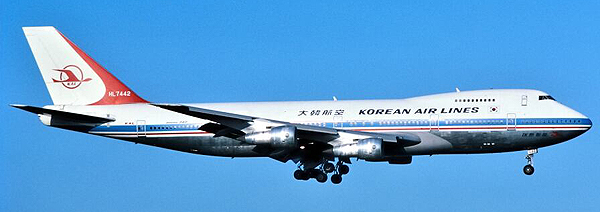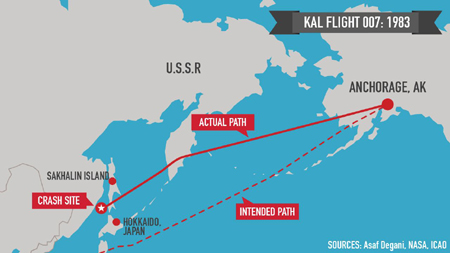|
Direction Determines Destination |
|
|
Coded Hostile (1989) is a British television film that chronicles the shooting down of Korean Air Lines Flight 007 over Sakhalin Island by Soviet warplanes on September 1, 1983, resulting in the deaths of all 269 passengers and crew. This tragedy exacerbated Cold War tensions between the United States, the Soviet Union, and their respective allies. The flight departed from John F. Kennedy International Airport, New York City, on August 31, twenty-five minutes after midnight. After refueling at Anchorage International Airport in Alaska, it departed for Seoul, South Korea, at 4 am AKDT, with Captain Chun Byung-in as the pilot for the final leg of the journey.
During the flight to Seoul, the plane started to gradually veer off course, eventually ending up about 200 miles from its intended flight path over restricted military airspace around the Kamchatka Peninsula. Two fighter jets were sent to intercept the plane, and failing to communicate with it, one of them destroyed the plane with an air-to-air missile as it flew over Sakhalin Island. About four years later, lawyers representing the relatives of those killed on the flight tracked down the pilot of KAL Flight 015, Captain Park Yong-man. He was also flying to Seoul from Anchorage that night, about 15 minutes behind Flight 007. Captains Park and Chun had a friendly professional and personal relationship for more than 20 years. Park was perhaps the last person to talk to Chun, and he presented his understanding of what happened. Park said that the first thing to be done when entering the cockpit of a plane before flight is to switch the flight computer to alignment, telling it the exact present location and destination. Once the map references are entered, the plane must stay absolutely still on the ground until the flight computer is aligned, usually taking about 20 minutes. Park said that if a mistake is made and the plane is moved too soon, the flight computer will give false navigational information and the plane will start to drift off course. He said that the deviation from the correct flight path would seem so slight at first that turning back would be deemed unnecessary. But once the deviation became serious, the point of no return would have passed. Park expressed his belief that the plane was moved before the flight computer was properly aligned. According to Park, Chun realized that the plane was going off course but chose to continue the flight instead of turning back to Anchorage. He described Chun as a very proud man, not wanting to lose face by admitting a mistake was made and needing to dump thousands of dollars' worth of fuel into the sea so that the plane would be light enough to land safely back at Anchorage. Park, out of respect for Chun, communicated with him discreetly, asking him why he was late reaching the next checkpoint. Chun said they were experiencing strong headwinds. When Park said that his plane was not facing any strong headwinds, Chun terminated communication. He knew that Chun was not relaying the correct information to him. Chun's pride and the desire to save face and maintain the approval of his colleagues and Korean Air Lines prevented him from taking the correct course of action to save himself, his crew, and the passengers relying on him to get them home safely. The incorrect navigational information and failure to turn around took them to the wrong destination, resulting in their deaths. As Jesus called on the people of Israel to repent and believe the gospel (Mark 1:14-15), performing many signs and miracles, many of His hearers, convicted in their hearts of the truth of His message, would not acknowledge that before God they were going in the wrong direction and needed to turn around, recognize their sin, and believe in Him for forgiveness, redemption, and eternal life.
Synagogues are Jewish buildings used for worship, prayer, study, assembly, the reading of the Torah, and other special ceremonies. They played a central role in the lives of Jews who practiced Judaism in the time of Jesus and up to the present day. Being in good standing in the local synagogue played an important role in social acceptance in the community, including family relationships, livelihood, and receiving support in hard times. Though many of the Jewish people knew that Jesus was the Messiah and that they needed to be aligned with Him, they preferred to save face with the religious leaders of their community and remain in the synagogue, not wanting to be ostracized and suffer hardships that would come from a collapse of their social credit score. They preferred the fleeting approval of man and the short-term benefits it provided over the permanent approval of God and the eternal benefits of fellowship with Him through Jesus Christ. Many people around the world today face similar circumstances, especially in Islamic and communist countries. Friends at church, who had years ago taught English as a second language to Chinese students in Australia, related two stories of people with whom they shared the gospel message. One man recognized the truth of the message but considered his significant social credit score in communist China, which allowed him to have many privileges and a comfortable life. He chose to keep his life in the direction it was going, not wanting to change course and follow Jesus, who gave His life as a ransom for sinners (Mark 8:34-37). Another student also heard the gospel and thought about the successful and privileged life he and his family enjoyed. He was convicted in his heart about the truth of the gospel and his need for Jesus, but he knew that he and his family could lose everything, including their home, if he became a Christian. After talking with his wife and sharing the gospel message with her, they both decided to change their direction in life and trust in Jesus. They had come to believe that no hardships they would face in this life would compare with their destination in eternity (Romans 8:18). Proverbs 29:25 says, "The fear of man brings a snare, but he who trusts in the LORD will be exalted." Like the pilot of the ill-fated KAL Flight 007 who, to save face, disregarded his true position and the need to turn around, we can be ensnared and taken off course by the desire for social acceptance that dissuades us from believing the gospel of Jesus Christ, leading to a permanent, terrible destination. The direction you go determines your destination. Repent and change your direction. Trust in Jesus for the forgiveness of your sins and the salvation He gives as a free gift, and have a glorious eternal destination! |
|
| Return | What Is the Gospel? | What Must I Do to Be Saved? | Home | |

